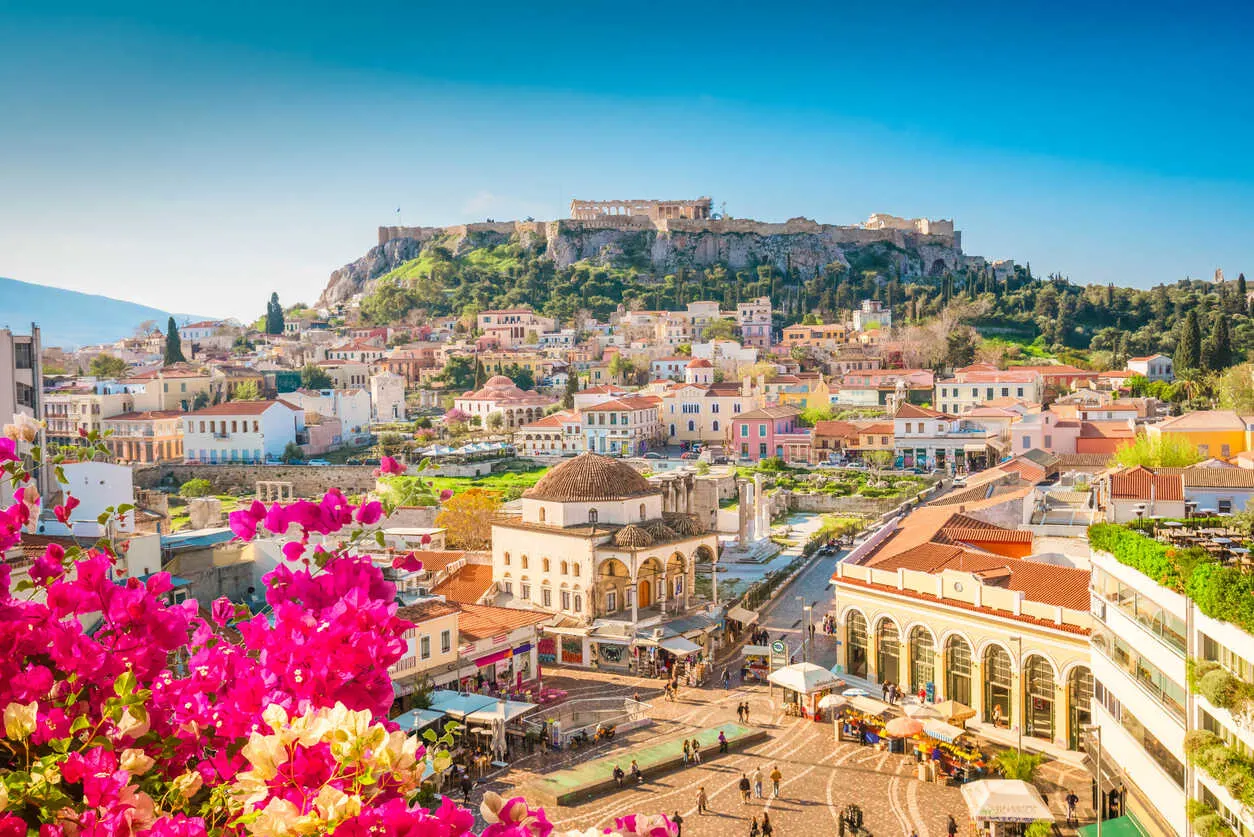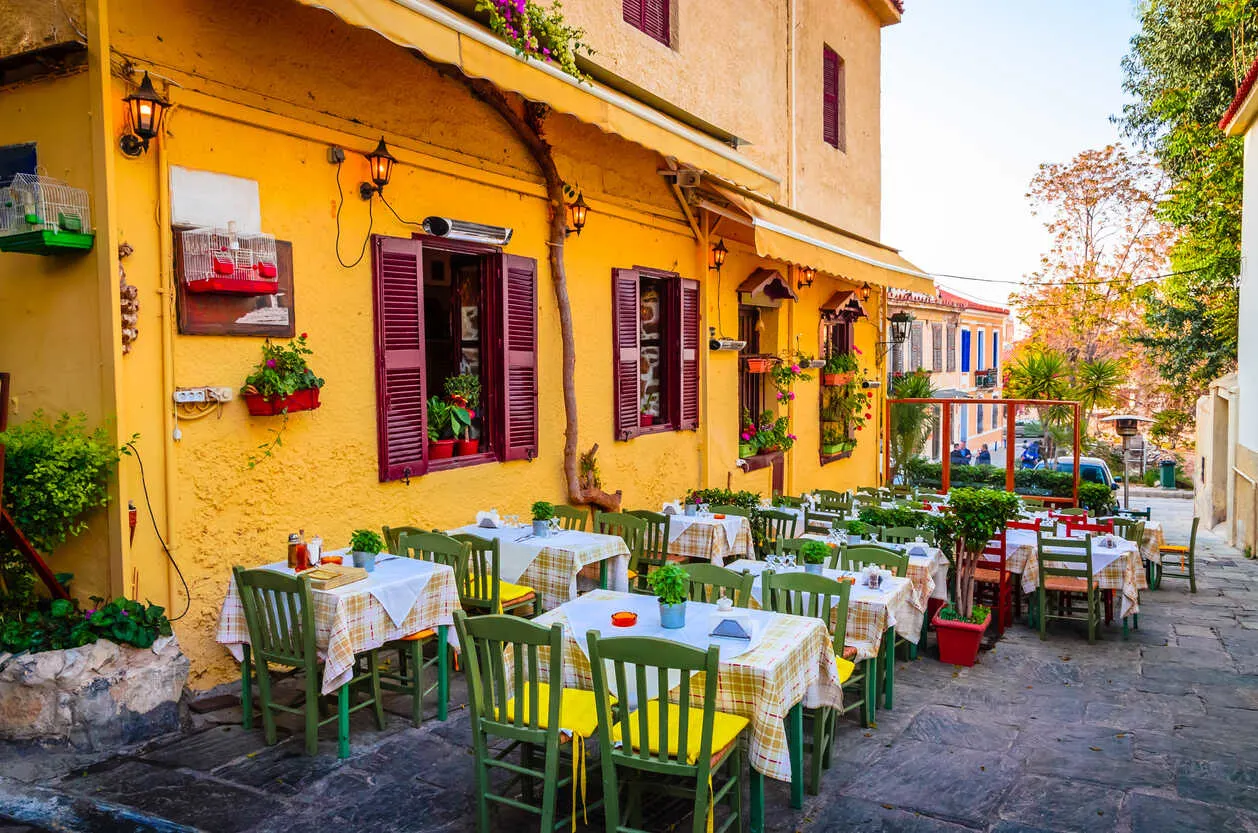When I left my stable life as a Certified Public Accountant (CPA) in San Francisco and moved to Athens to start over, without knowing anyone, there was a lot of uncertainty about how life would unfold. More than a decade later, I’ve completely redesigned my life. I now teach yoga under the Acropolis, and I’ve become a writer and Enneagram trainer. Greece feels familiar now, but during my first few years, I encountered plenty of surprises—some good, some less so—all of which have made this chapter of my life a big adventure.
Below, I’m sharing just some of my top surprises as an American moving to Greece..
Get Your Free Greece Report Today!
Get Your Free Greece Report Today!
Learn more about a slower pace of life in Greece and other countries in our free daily postcard e-letter. Simply enter your email address below and we'll also send you a FREE REPORT — Retire in Greece—Find Your Dream Retirement in This European Archipelago.

By submitting your email address, you will receive a free subscription to IL Postcards, The Untourist Daily and special offers from International Living and our affiliates. You can unsubscribe at any time, and we encourage you to read more about our Privacy Policy.
1. Free Emergency Care
Access to healthcare is an important factor when moving to a new country, so I was shocked to learn that emergency medical care in Greece is free, and “emergency” can be loosely applied.
One year, I got a minor eye infection and went to a public clinic without an appointment. I offered my passport, waited about ten minutes, and saw a doctor who spoke perfect English. After the exam and a prescription, I asked how to pay. The receptionist looked puzzled: “Pay for what?”
That’s when I learned that if you have a medical emergency in Greece, you don’t need to worry about the bill because there won’t be one. You can learn more about Healthcare in Greece here.
2. College is Free
When my friend Maria said she and her husband were thinking of having a second child less than two years after their first, I asked, “Aren’t you worried about paying for college?” She laughed. “What are you talking about? College is free.”
As an American, that stunned me. I don’t know a single parent in the U.S. who doesn’t stress over college costs. Later, I learned that once I become a Greek citizen, I could pursue a master’s degree here for free, too.

3. Tax Deadlines Are Ever-Changing
In the U.S., our annual tax deadline, April 15, hasn’t changed since 1955. It is a date we all know and expect, and is almost a cornerstone of American culture. Not so in Greece.
Here, the tax due date shifts every year, depending on factors like Orthodox Easter, online platform issues, or whether people need more time to pay. As a CPA, I was baffled at first by how often Greeks meet with their accountants. Now I understand: the tax system is fluid, inconsistent, and full of overlapping regulations. If you move to Greece, get yourself a good accountant.
4. Cheap, Delicious Wine
Greek wine has become internationally recognized for its quality, but what’s still unexpected is how inexpensive it is. At most tavernas, a half-liter (about two-thirds of a bottle) of house wine costs around four euros, less than $5. A full liter is usually eight euros, so there’s no incentive to overindulge.
Greek culture values enjoyment and socializing, not excess. It’s rare to see anyone overtly drunk.

5. Farmers’ Markets Beat Groceries
In Greece, there’s something called the laiki, a type of farmers’ market that pops up in most neighborhoods in cities like Athens and Thessaloniki. The schedule rotates from area to area, and local farmers bring their fresh produce to sell.
While the food may or may not be officially organic, it’s almost always home-grown using traditional methods. What surprised me early on was how inexpensive the fruit, vegetables, nuts, olives, eggs, flowers, and more are at the laiki. Coming from San Francisco, where the Ferry Building farmers’ market is impressive but also gourmet and expensive (think salmon candy and specialty aged cheeses), the Greek laiki is a refreshing change.
For under €25 (about $30), I can buy all my produce, nuts, and olives for the week. It’s more cost-effective than local grocery stores, offers higher quality, and is far more fun, because if you go regularly, you eventually get to know the farmers.
Get Your Free Greece Report Today!
Get Your Free Greece Report Today!
Learn more about a slower pace of life in Greece and other countries in our free daily postcard e-letter. Simply enter your email address below and we'll also send you a FREE REPORT — Retire in Greece—Find Your Dream Retirement in This European Archipelago.

By submitting your email address, you will receive a free subscription to IL Postcards, The Untourist Daily and special offers from International Living and our affiliates. You can unsubscribe at any time, and we encourage you to read more about our Privacy Policy.
6. Doctors Are Super Accessible
When I lived in the United States, I had to book medical appointments months in advance. The process involved calling a clinic and scheduling through an administrator. So you can imagine my surprise when I called to make my first Greek appointment and was asked what time the following week I wanted to come in.
Stranger still, after our first session, my doctor gave me her mobile number and told me to message her if I needed anything. There’s a level of personal care in Greece that surprised me at first, but that I’ve come to love.
7. English Gets You Far
Some of my friends and family were nervous about visiting me in Greece, worried about how they’d communicate. What I’ve come to appreciate is that English is the universal common language here. If you’re a native English speaker, you already have a huge advantage, probably without realizing it.
When I’m with a group of friends that includes Greeks, Germans, French, and Americans, everyone automatically switches to English. This isn’t to accommodate me, it’s simply the language everyone shares. I never really thought of my English fluency as an asset abroad, but it turns out it is.

8. Exotic Weekend Trips Are Easy
When I lived in the United States, trips to Egypt, Turkey, or Lebanon seemed incredibly exotic—once-in-a-lifetime experiences. But since moving to Athens, I’ve been able to visit these places almost casually.
In less than three hours by plane and for under $300, you can book a trip to Cairo, Istanbul, Beirut, Paris, and beyond. Greece sits at the intersection of East and West, making it easy to experience diverse cultures. I’ve shattered many of my own assumptions while living here—thanks to being able to see the world firsthand.
9. Low Salaries, Low Cost of Living
Because Greece is part of the European Union, it often gets lumped together with countries like Germany, France, and Sweden. However, what I didn’t realize until I lived here is that Greece has relatively low wages. The average monthly salary for 2024 is €1,342 (approximately $1,600).
That means the cost of living is also lower, since most people make life work on that income. If you move to Greece, expect rent, beauty services, out-of-pocket medical costs, meals out, and even cell phone bills to be far less than in most of the United States.
10. Filoxenia: True Hospitality
In Greece, there’s a word—filoxenia—which roughly translates to “offering friendship to strangers.” It captures the Greek mindset toward foreigners, and it struck me immediately when I moved to Athens.
People I’d just met invited me to their summer homes, not out of forwardness, but genuine friendliness. Shopkeepers, neighbors, and even casual acquaintances asked about my family, pets, and travels with sincere interest.
I always describe Greece as a deeply humane country, one where people care about and are curious about each other. It’s one of the things I appreciate most about Greek culture.

In Closing
After more than a decade in Greece, I’ve learned that moving abroad isn’t just about trading one country for another; it’s about expanding your definition of home.
Greece has taught me to slow down, savor life’s simple pleasures, and value connection over convenience. From the warmth of filoxenia to the thrill of weekend adventures, this country has surprised me in ways I never could have imagined back in San Francisco.
Living here hasn’t just changed my address. It has changed my perspective.
And while the United States is where I spent most of my first 40 years, Greece has given me something more enduring: a deeper appreciation for what it means to truly live well.
Get Your Free Greece Report Today!
Get Your Free Greece Report Today!
Learn more about a slower pace of life in Greece and other countries in our free daily postcard e-letter. Simply enter your email address below and we'll also send you a FREE REPORT — Retire in Greece—Find Your Dream Retirement in This European Archipelago.

By submitting your email address, you will receive a free subscription to IL Postcards, The Untourist Daily and special offers from International Living and our affiliates. You can unsubscribe at any time, and we encourage you to read more about our Privacy Policy.
